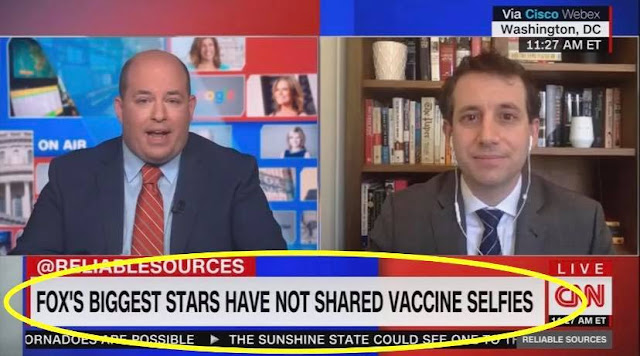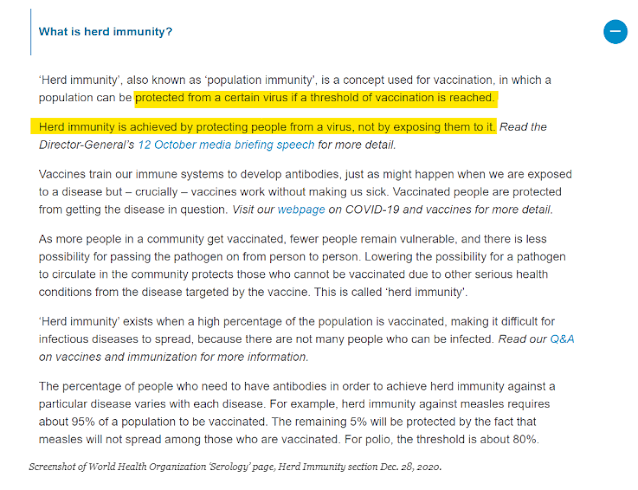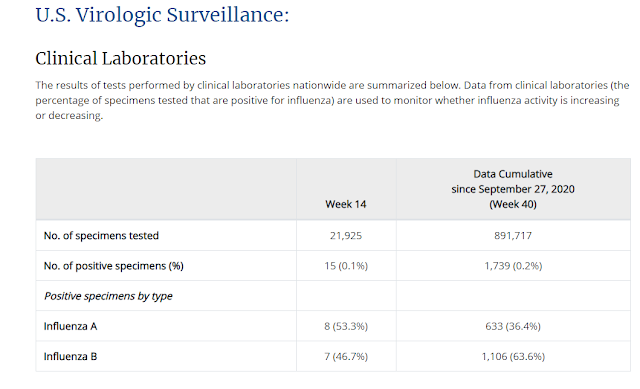To Get or Not Get a Not-Vaccine: Anatomy of a Fact Check
The burning question of 2021: should you get a COVID-19 vaccine? To anyone turning on a device with network television or cable programming, the answer is, yes, of course! Not only should you get it, but you should share vaccine selfies, especially if you're a celebrity, to encourage others to get it. And those refusing to take and share said selfies should be shamed for their civic-duty failure [*1]. The question isn't whether you should get one but what a socially-acceptable minimum level of enthusiasm for getting one should be.
These "vaccines" may be more-appropriately deemed "not-vaccines," considering they were never tested to see if they prevent human-to-human transmission of the virus [*2]. The two reasons to get a vaccine: (1) to greatly decrease, if not eliminate, the probability you will get a particular ailment and (2) to greatly decrease, if not eliminate, the probability you will transmit a particular ailment to others. If a vaccine was never tested to see if subjects of the vaccine could spread the contagion to others, then it can't truly be considered a "vaccine." Or, can it?
Persuasive Redefinition
It can by using persuasive redefinition. The public understands an older traditional definition for a term. The definition in modern dictionaries is slowly expanded. An authority then pushes the term on the public, knowing the public is relying on the old definition. However, the authority knows full well a new definition is being applied, and the public is misled. After all, who has the time to keep looking up definitions every year to see how they've changed? The authority gets more compliance if the public relies on a more powerful definition of a word (like vaccines causing immunity). If the public was generally aware of the change in definition (like vaccines merely causing an immune response), it probably wouldn't be as compliant with the authority's suggestion.
The game of persuasive redefinition is nothing new [*3]. There are multiple conflicting definitions of a vaccine. When we call something a "vaccine," what we're talking about changes with the definition we are choosing. There are some that encompass the vaccine recipient's transmission of a virus to another and others that focus only on stimulating an immune system response, meaning spreading the virus is still possible [*4].
This 2005 definition is fairly on-the-nose when it comes to what most people think of when they hear the word "vaccine." The recipient "gains IMMUNITY;" thus it's inferred the recipient will not transmit the vaccinated-against contagion to another after receiving the vaccine.
Over the years, the definition of "vaccine" has been continuously watered down.
Prophylaxis means an action taken to prevent disease. Thus, the above 2012 definition, which adds the qualifier "intended" to "active immunologic prophylaxis," is far weaker.
But check out Merriam Webster's latest definition of "vaccine," (last checked April 12, 2021) and note the absence of phrases like "gains immunity" or "prophylaxis," and, curiously, a new alternate definition is added: "preparation of genetic material (such as a strand of synthesized messenger RNA) that is used by the cells of the body to produce an antigenic substance (such as a fragment of virus spike protein)." The potential dangers or panacea wonders of RNA vaccines are beyond my scope here. I simply note that, rather than use a new word to familiarize the public with a newer experimental technology, a sub-definition of vaccine is added to encompass the new technology.
An antigenic response is related to an "immune response."
Note now the definitions have gotten less and less related to a causal effect of immunity. The differences in these redefinitions are not trivial. One product, when used, gets a result. The other, when used, stimulates a process that might get a result.
The virtuous reason to get a COVID-19 vaccine is related to the "asymptomatic spreader" hypothesis, that we might get the virus du jour without knowing it or even feeling any symptoms and subsequently be spreading it to others. Therefore, if we get a vaccine, we are less likely to spread the virus to others. This is the moral case the World Health Organization (WHO) makes for getting vaccinated [*5].
The WHO is a political organization that changes medical definitions frequently, as I've pointed out before [*6]. Note how they inverted the definition of "quarantine" from what my Black's Law Dictionary (and any other dictionary for that matter) says.
The WHO pulled the same shenanigans with their definition of "herd immunity." The WHO had defined it, as of an update on June 9, 2020, as "the indirect protection from infectious disease that happens when a population is immune either through vaccination or immunity developed through previous infection." This is the common definition found in most dictionaries.
The notion of herd immunity being achieved through "previous infection," as opposed to solely through vaccination, was removed by the WHO on November 13, 2020 with a curious update, as captured by the Vision Times on December 28, 2020 [*7].
The WHO curiously changed the definition back to the original on December 31, 2020 [*8]. Which definition is supposed to be the correct one? And what caused the three-time changes in definition over the course of a couple months? We wonder.
The WHO lists the first means toward herd immunity as through vaccination (and with a prior definition, the only means), but the current COVID-19 vaccines can't cause herd immunity if they were never tested on human-to-human transmission.
Anatomy of a Fact Check
Now we come to the meat of our discussion. A subsequent fact check published via Reuters tried to "debunk" the notion that these COVID-19 vaccines do not stop human-to-human transmission, in a comically feckless manner [*9].
Wow! That's interesting. There's no evidence it doesn't stop human-to-human transmission. Therefore, the fact that these vaccines were never tested for it doesn't mean they won't do it anyway! Not even the boldest snake-oil salesman could effectively deploy that line to procure a sale, especially since the manufacturers of these vaccines are all immune from liability [*10]. That's right. Their products might not make you immune, but they are certainly immune from you if anything bad happens minutes or decades into the future and you or a loved one demand financial compensation for an injury or death.
The Reuters "fact check" concludes:
The United Kingdom government (linked in the "fact check") confesses that they don't know whether the vaccines will stop the spread [*11].
A Harvard publication confesses the same [*12].
This Harvard piece also states that the vaccines did not fair well against infection from some mutations of the virus.
Freedom as a Subscription Service
Acute readers see where this is going. And it's been all but confirmed by one of the leading manufacturers of these vaccines. Pfizer CEO Albert Bourla said at a virtual event hosted by CVS Health: "There will be likely a need for a third dose, somewhere between 6 and 12 months. And then from there. There will be an annual revaccination. But all of that needs to be confirmed.[*13]."
Meanwhile, the flu numbers have fallen 98% according to the American Center for Disease Control (CDC) [*14], while COVID-19 has maybe "muscled it aside," [*15], as if corona viruses were immortals competing for power in the classic film, Highlander ("There can only be one!").
Influenza ("the flu") isn't just one virus. We see tens of millions of cases, with multiple iterations every year [*16], and can get an annual "flu shot" (rarely called a "flu vaccine") to mitigate its impact. Note the CDC chart below counting 38 million cases in 2019-2020.
But note the flu numbers from September 27, 2020 to April 16, 2021 on the CDC website: 1,739 [*17].
Meanwhile, COVID cases in the U.S., per the CDC are at about 33 million. COVID-19 is a variant of the flu. We never get the same "flu" each year. This year, we don't have the flu. We have COVID. It doesn't take a genius to figure out what's going on.
The main reason, as I've discussed before, here [*18] and here [*19] that these COVID-19 vaccines are being pushed as a bait-and-switch for the seasonal flu vaccine is to create a system of seasonal immunity certificates for public travel, in which pharmaceutical companies can make trillions of dollars in a recurring market model for essentially giving the annual flu shot to the global population. These not-vaccines' positive effects on reducing symptoms are temporary, as mutations of the virus are admitted as not covered by the initial vaccination. Naturally, we'll need more and more not-vaccines.
How do businesses make money? One way is to eat into a current market share with a better product or idea. But, what happens when your business becomes a monopoly? How do you continue to grow? Rather than sell you a good, they sell you a subscription. Ownership of a quality good infers an investment and money and time saved by the buyer. The buyer gets one quality item and is set for life. But, the corporation makes money one time. A recurring-market model, however, allows the corporation to extract revenue on a cyclical basis.
What happens when governments in conjunction with private businesses collude to make your semi-annual or annual not-vaccination a requirement for public travel, like getting on an airplane, going to a wedding or funeral, or going to a concert or public event? Or, perhaps, for the privilege of maintaining a driver's license or custody of your children. Will you become a subscriber to seasonal vaccination more for your health and safety or more because you simply want your freedom?
A one-time cure for those who get the flu isn't nearly as profitable as a model where the eight-billion denizens of planet Earth are pressured, if not commanded by law, to get a new flu vaccine every six, nine, or twelve months.
Now that you see where this is going, will you go along for the ride?
---
FOOTNOTES
[*1] https://www.bizpacreview.com/2021/04/12/everybody-else-is-doing-it-cnns-stelter-whines-fox-news-hosts-arent-sharing-vaccine-selfies-1058787/
[*2] https://www.reuters.com/article/uk-factcheck-transmission-idUSKBN29N1UH
[*3] https://stratagemsoftheright.blogspot.com/2020/05/persuasive-redefinition-what-does.html
[*4] https://medical-dictionary.thefreedictionary.com/vaccine
[*5] https://www.who.int/news-room/q-a-detail/vaccines-and-immunization-what-is-vaccination
[*6] https://stratagemsoftheright.blogspot.com/2020/05/persuasive-redefinition-what-does.html
[*7] https://visiontimes.com/2021/01/01/who-redefines-herd-immunity-in-push-for-coronavirus-vaccination.html
[*8] https://www.who.int/news-room/q-a-detail/coronavirus-disease-covid-19-serology
[*9] https://www.reuters.com/article/uk-factcheck-transmission-idUSKBN29N1UH
[*10] https://www.gov.uk/government/publications/covid-19-vaccination-what-to-expect-after-vaccination/what-to-expect-after-your-covid-19-vaccination
[*11] https://www.phe.gov/Preparedness/legal/prepact/Pages/default.aspx
[*12] https://www.health.harvard.edu/coronavirus-and-covid-19/covid-19-vaccines
[*13] https://www.yahoo.com/news/biden-working-ensure-u-booster-011541467.html
[*14] https://www.nbcnews.com/nightly-news/video/u-s-flu-numbers-drop-dramatically-98705477766
[*15] https://abcnews.go.com/Health/wireStory/amid-covid-19-pandemic-flu-disappeared-us-76102895
[*16] https://www.cdc.gov/flu/about/burden/
[*17] https://www.cdc.gov/flu/weekly/weeklyarchives2020-2021/WhoNPHL14.html
[*18] https://stratagemsoftheright.blogspot.com/2021/01/the-broken-thumb-heuristics-in-fall-of.html
[*19] https://stratagemsoftheright.blogspot.com/2021/04/the-politics-of-masks-virtuous.html




























Comments
Post a Comment